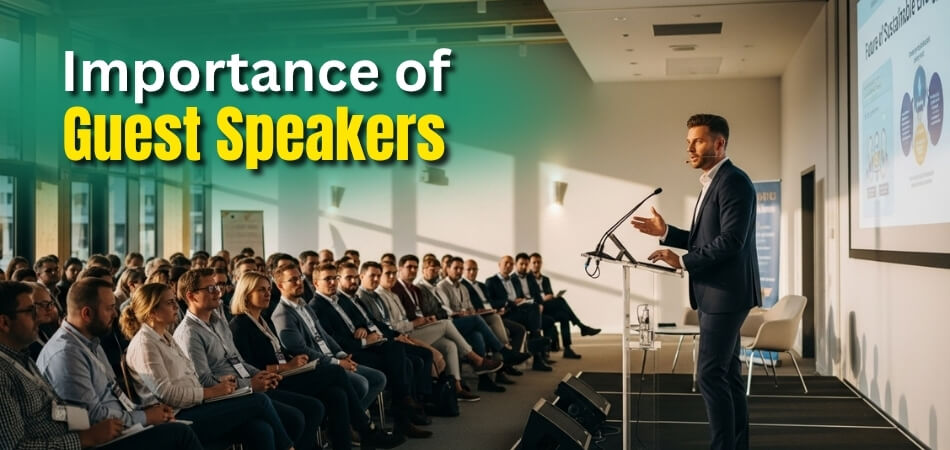Conferences today are more than scheduled sessions; they are experiences that aim to inspire, educate, and connect. A strong way to achieve that is by bringing in guest speakers who offer expertise, energy, and new perspectives that keep audiences engaged. Their presence turns a regular gathering into a memorable exchange of ideas and inspiration.
Understanding why are guest speakers important at a conference helps organizers create events that truly stand out. The right speaker can strengthen credibility, spark meaningful discussions, and motivate attendees to take action. This article explores how guest speakers add value, maximize engagement, and leave a lasting impact on every conference.
Why Are Guest Speakers Important at a Conference?
Guest speakers are one of the most valuable elements of any conference. They elevate the event by sharing expertise, credibility, and inspiration that participants remember long after it ends. Here are the most meaningful reasons guest speakers play such a vital role in making conferences successful.

Bring Credibility and Authority
A knowledgeable guest speaker lends trust and recognition to your event. Their expertise confirms that your conference is built on quality content and valuable insights. Attendees feel assured that they are learning from someone respected in the industry, which enhances your event’s reputation and professional image overall.
Share Fresh Perspectives and Industry Insights
Guest speakers bring in viewpoints from different sectors, helping attendees understand current trends and future opportunities. Their real-world examples and research-backed discussions broaden perspectives and make learning more relevant. This exposure to diverse ideas ensures participants leave with a deeper understanding of emerging industry directions.
Motivate and Inspire Attendees to Act
Beyond sharing facts, the best guest speakers ignite motivation. Their personal experiences and success stories encourage attendees to think differently and pursue new goals. Inspiration is a powerful takeaway that keeps participants engaged long after the event, fueling both professional growth and practical action in their daily work.
Spark Interaction and Networking Opportunities
Guest speakers encourage meaningful dialogue between attendees. Q&A sessions, workshops, and follow-up conversations allow participants to connect with peers who share similar interests. These interactions build community and foster collaborations that continue after the conference, turning one-time meetings into long-term professional relationships and opportunities for future partnerships.
Help Attract a Wider Audience and Media Attention
Having a well-known or accomplished guest speaker can boost attendance and media coverage. Their presence draws interest from professionals, sponsors, and journalists eager to hear their insights. This expanded visibility helps position the conference as a must-attend event within its field, driving more participation and engagement overall.
Align with Upcoming Global Events and Agenda Storytelling
Announcing your guest speaker early builds excitement and anticipation. When their topic connects naturally with the upcoming conferences, it keeps your audience curious and invested in future events. This storytelling approach strengthens brand continuity, allowing each conference to complement the next in both theme and audience interest.
Strengthen the Event’s Educational Value
Guest speakers transform theory into practical learning. They offer real-world context that complements research and presentation sessions, helping participants apply what they learn. This combination of academic depth and practical experience makes the conference more valuable, ensuring that attendees leave with actionable insights they can implement immediately.
Guest speakers shape the tone, credibility, and long-term value of every conference. Their influence extends beyond the stage, inspiring attendees to think, connect, and grow. Including the right guest speakers ensures your event achieves lasting relevance and genuine impact across audiences.
Unique Benefits Often Overlooked
Beyond the visible impact, guest speakers bring subtle yet powerful advantages that many organizers miss. These hidden benefits can strengthen your event’s long-term value and audience connection. Let’s explore these often-overlooked contributions before moving to the next discussion.
- They Reinforce the Event Theme and Educational Goals: Guest speakers help unify the conference theme by aligning their talks with its key message. Their insights support your educational objectives, making sessions feel more cohesive and purpose-driven throughout the entire event.
- They Generate Post-Event Value Through Content Reuse: A powerful presentation continues to benefit your brand even after the event. Recordings, summaries, or quotes from guest speakers can be shared through blogs or social media, extending your event’s reach and engagement.
- They Build Long-Term Partnerships and Brand Trust: Inviting speakers whose values align with your organization can open doors for future collaborations. They may return for webinars, panels, or co-created projects, turning a single event into an ongoing professional relationship.
- They Enhance Attendee Retention and Loyalty: When attendees enjoy a speaker’s session, they are more likely to return to future events. Strong speaker experiences help establish brand loyalty and long-term audience relationships that support sustained conference growth.
Recognising these lesser-known benefits ensures you don’t just plan a one-time event but create lasting value. By focusing on meaningful collaborations and consistent messaging, guest speakers can leave an impact that extends well beyond the conference stage.
How to Choose the Right Guest Speaker?
Selecting the right guest speaker can define the success of your conference. It’s about finding someone who resonates with your audience and aligns with your event’s purpose. Follow these key steps to make an informed choice before moving to the next discussion.
Match Their Expertise to Your Audience’s Needs
Start by identifying who your attendees are and what they expect to learn. A speaker’s background should match the skill level and interests of your audience. This ensures that every participant connects with the topic, gaining relevant insights they can apply immediately.
Assess Speaking Style and Engagement Approach
Different audiences respond to different speaking styles. Some prefer storytelling and interaction, while others value data-driven presentations. Watch previous sessions or demos to see how well the speaker engages listeners. Choose someone whose delivery style complements your event’s tone and setting.
Review Past Talks, Testimonials, and Credibility Markers
Always research a potential speaker’s track record. Look for videos, event feedback, and professional reviews to understand their impact. A proven speaker with solid testimonials ensures reliability and audience satisfaction, adding credibility to your event’s overall experience and reputation.
Ensure Alignment with Conference Theme and Vision
A speaker must fit your conference’s message and values. Even a famous name can weaken impact if their topic or tone feels disconnected. Ensure their presentation supports your event goals, helping create a seamless and meaningful flow throughout the program.
Consider Availability and Budget Early
Contact potential speakers in advance to confirm schedules and costs. Early communication prevents last-minute conflicts and allows negotiation flexibility. Being transparent about expectations, duration, and compensation ensures professionalism and sets the stage for a smooth collaboration.
Choosing the right guest speaker is a careful mix of audience understanding, theme alignment, and strategic planning. When selected thoughtfully, the speaker not only enhances engagement but also reinforces the core purpose and value of your entire conference.
Maximizing the Impact of Guest Speakers
Inviting a guest speaker is only the first step; how you manage their involvement determines their true impact. With the right preparation and follow-up, their session can leave a lasting impression on your audience. Let’s explore effective ways to maximize their contribution before moving to the next discussion.
Prepare Them With Context and Audience Insights
Provide your guest speaker with detailed information about the event’s goals, audience background, and expectations. Share insights on participant interests, preferred tone, and key challenges. This helps them tailor their talk, ensuring every point connects meaningfully with attendees and delivers maximum relevance and engagement.
Promote Their Session Early to Build Buzz
Generate excitement before the event by showcasing the speaker in your marketing campaigns. Highlight their expertise through email teasers, social media posts, or blogs. You can also share creative guest speaker presentation ideas to build curiosity and encourage participation, making the audience eager to attend their session.
Integrate Their Talk With Networking and Breakout Sessions
Plan your schedule so that the guest speaker’s session aligns with networking breaks or panel discussions. This setup encourages follow-up interactions and deeper learning. By linking their topic to collaborative spaces, you create continuity that strengthens overall event engagement and attendee satisfaction.
Gather Feedback and Repurpose Highlights Post-Event
After the session, collect feedback to measure effectiveness and capture memorable insights. Record video clips or quotes and reuse them in post-event marketing. Sharing these highlights keeps your audience connected and reinforces the value of both the speaker and your event.
Maximizing a guest speaker’s impact requires thoughtful preparation, promotion, and follow-through. When you integrate their presence into the broader conference strategy, their message continues to inspire and strengthen your event’s reputation long after the session concludes.
Measuring the Success of Guest Speaker Sessions
Evaluating the success of a guest speaker goes beyond applause; it involves assessing real outcomes and audience responses. Measuring key metrics helps organizers understand impact and improve future events. Let’s review the essential ways to evaluate effectiveness before moving to the next discussion.
- Attendance and Engagement Metrics: Track how many attendees join and remain throughout the session. A high attendance rate combined with active participation, such as questions or note-taking, reflects a strong connection between the speaker and the audience.
- Participant Feedback and Post-Session Surveys: Gather attendee feedback to understand how the session influenced their learning and perspective. Ask specific questions about takeaways, content relevance, and presentation quality to gauge the overall effectiveness of the speaker’s contribution.
- Social Media Mentions and Press Coverage: Monitor social media platforms and press articles mentioning the speaker or event highlights. Positive buzz indicates that the session sparked discussion and extended visibility beyond the conference hall, amplifying brand recognition.
- Return on Investment (ROI) Through Future Registrations: A successful guest speaker can increase event registrations and renew attendee interest for upcoming gatherings. Tracking referral data and return participation helps determine long-term value and validates your investment in quality speakers.
Measuring impact ensures that guest speaker sessions are not just engaging but truly meaningful. By analyzing these indicators, organizers can identify what worked best and use the insights to design even more impactful conference experiences in the future.
Common Mistakes to Avoid When Inviting Guest Speakers
Even with the best intentions, conference organizers sometimes make errors that limit a guest speaker’s effectiveness. Recognizing these mistakes early helps you create a smoother experience and stronger outcomes. Let’s explore these common pitfalls before moving to the next discussion.
Overlooking Audience Relevance
Selecting a famous name might seem appealing, but if their message doesn’t align with your audience’s needs, the session can lose impact. Always prioritize relevance over popularity to ensure every attendee feels connected and gains genuine value from the presentation.
Not Providing Adequate Preparation Time
Guest speakers perform best when they understand the event’s goals, audience, and structure. Failing to brief them properly can cause mismatched content or poor timing. Share clear details, session objectives, and logistics early to help them prepare effectively and deliver a cohesive message.
Choosing Popularity Over Substance
Well-known personalities might draw crowds, but popularity doesn’t always guarantee meaningful insight. Focus on speakers who can contribute depth, expertise, and authentic experiences that enrich the conference content and highlight the true role of a guest speaker in delivering real educational value.
Ignoring Follow-Up Collaboration Opportunities
Many organizers overlook the value of ongoing collaboration. Stay connected after the event to explore future sessions, content partnerships, or mentorship opportunities. Building long-term relationships with speakers enhances brand credibility and maintains engagement across multiple events.
Avoiding these mistakes ensures your conference benefits fully from your guest speakers’ expertise. By focusing on preparation, alignment, and long-term collaboration, you can transform each session into an impactful and lasting experience for your audience.
FAQs About Guest Speakers at Conferences
Guest speakers often spark curiosity among organizers and attendees alike. Knowing the finer details can help you plan more effectively and set realistic expectations. Below are some frequently asked questions with helpful insights. Explore them before moving to the final discussion.
How Are Guest Speakers Different From Panelists?
Guest speakers deliver individual sessions focused on specific topics, while panelists discuss subjects collectively, sharing diverse perspectives through moderated dialogue. Both add value, but guest speakers typically offer deeper personal expertise and storytelling.
How Far in Advance Should Guest Speakers Be Booked?
Ideally, book guest speakers three to six months in advance. This allows time for coordination, marketing, and content preparation, ensuring their availability and alignment with your event’s goals and schedule.
Can Guest Speakers Customize Their Topics?
Yes, most guest speakers are open to tailoring their sessions. Providing a clear brief about your audience, theme, and objectives helps them shape content that feels relevant and impactful for attendees.
What Should Be Included in a Guest Speaker Agreement?
A strong agreement should outline payment terms, presentation format, deadlines, travel arrangements, and promotional expectations. Clear documentation prevents confusion and helps maintain a professional working relationship with your speaker.
How Long Should a Guest Speaker’s Session Be?
The ideal duration depends on the event type, but most guest sessions last between 20 to 45 minutes. This length keeps audiences engaged while allowing enough time for discussion or Q&A.
How Can Organizers Support Guest Speakers on Event Day?
Provide on-site assistance such as a dedicated contact person, technical checks, and refreshments. These small gestures reduce stress and help speakers focus entirely on delivering a confident, polished performance.
What Are the Best Ways to Introduce a Guest Speaker?
Keep introductions short, relevant, and engaging. Mention the speaker’s achievements, connection to the event theme, and what the audience can expect to learn. A strong opening boosts anticipation and attention.
How Should Organizers Handle Cancellations or Replacements?
Always have a backup plan. Maintain communication with secondary speakers or panelists who can step in if needed. Quick, transparent updates to attendees help maintain trust and professionalism.
Can Guest Speakers Engage Audiences Virtually?
Absolutely. Many speakers are comfortable presenting online using interactive tools like polls and live chats. Virtual sessions offer accessibility and cost savings while retaining audience engagement and value.
How Can Organizers Evaluate Long-Term Impact?
Track audience feedback, future attendance, and collaborations resulting from the session. Analyzing post-event data helps identify whether the guest speaker’s influence extended beyond the conference and contributed to ongoing engagement.
Final Thoughts
When done right, guest speakers are far more than a schedule item; they become catalysts for learning, connection, and brand growth. From aligning their message with your event’s theme to measuring the ripples of their presence, their contribution can be unmistakable.
If you want your next conference to stand out, begin by asking, why are guest speakers important at a conference? Then proceed to design, select, and deploy them strategically. The right guest speaker can transform your event from good to unforgettable.







